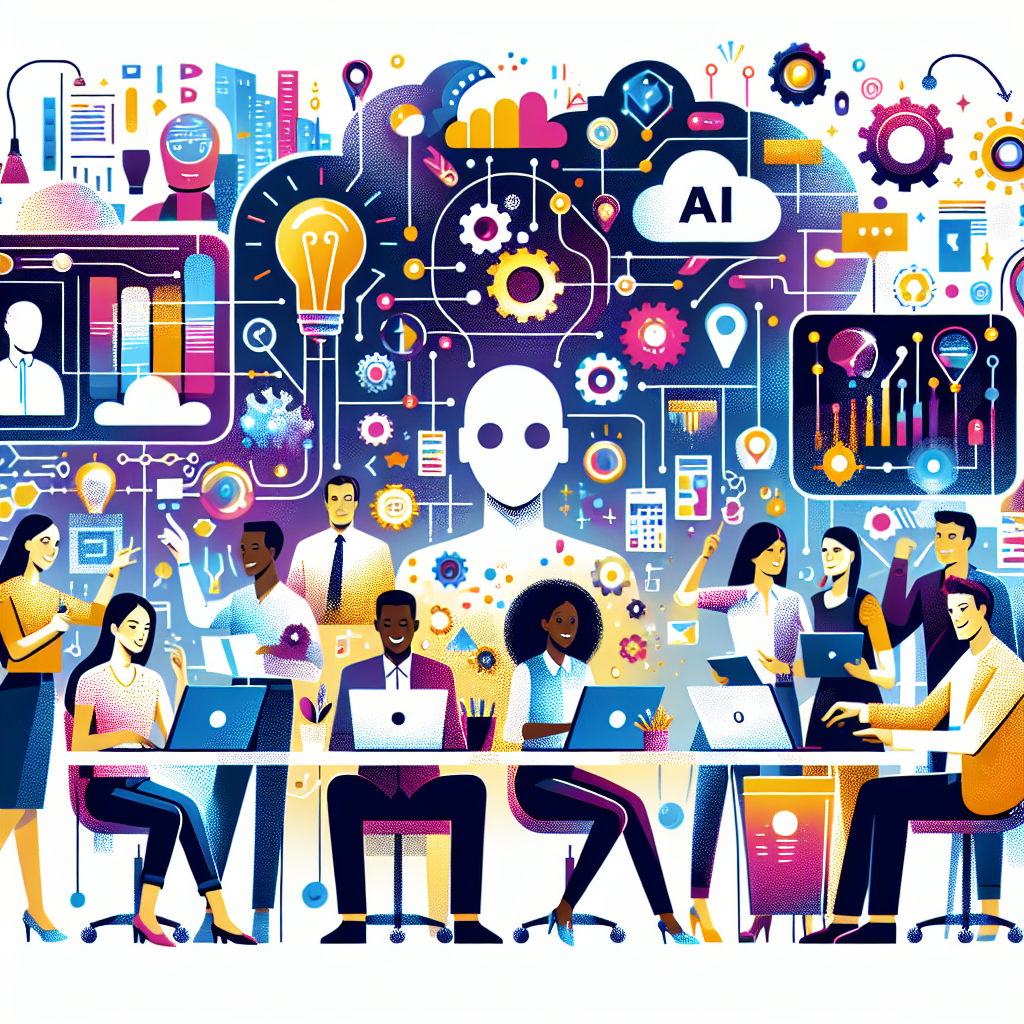Google has made a new computer brain called Gemini. This brain is very smart and can answer hard questions by thinking hard. It can work with words, pictures, and sounds. Google will use Gemini in its search engine and in a talking computer friend named Bard.
Google’s Gemini has to deal with other smart computer brains made by different people. One is called ChatGPT, and another one is being made by a man named Elon Musk. People are excited about these smart brains but also a little worried. Countries are trying to make rules to keep these computer brains safe.
Google’s Gemini is a big step in making computer brains better. It can learn from many things, not just words. But it has to compete with other smart brains. People who make these brains and the leaders of countries are thinking about how to keep everything safe.
Original news source: Google claims new Gemini AI ‘thinks more carefully’ (BBC)
Listen:
Slow
Normal
Fast
Vocabulary:
| 1 | computer brain | A very clever machine that can do difficult tasks |
| 2 | smart | Intelligent or clever |
| 3 | answer | Give a response to a question or problem |
| 4 | think | Use your brain to come up with ideas or solutions |
| 5 | words | Things we say or write |
| 6 | pictures | Images or photographs |
| 7 | sounds | Noises that we hear |
| 8 | search engine | A tool on the internet that helps you find information |
| 9 | talking computer friend | A computer program that can talk to you |
| 10 | rules | Guidelines or instructions to follow |
| 11 | compete | Try to be better than someone else |
| 12 | leaders | People who are in charge and make important decisions |
Group or Classroom Activities
Warm-up Activities:
– News Summary
Instructions:
1. Read the article to the students or provide them with a written copy.
2. Ask the students to write a summary of the article in their own words, highlighting the main points.
3. After a few minutes, have the students share their summaries with a partner or in small groups.
4. Encourage discussion and ask follow-up questions to check comprehension.
– Vocabulary Pictionary
Instructions:
1. Select a few key vocabulary words from the article (e.g. Gemini, search engine, computer brain, smart, compete).
2. Write each word on separate pieces of paper and place them in a hat or container.
3. Divide the students into small groups.
4. One student from each group will pick a word from the hat and have to draw it on the board while their teammates try to guess the word.
5. The group that guesses the word correctly earns a point.
6. Repeat the process with different words and rotate the role of the drawer.
– Headline Creation
Instructions:
1. Divide the students into pairs or small groups.
2. Instruct each group to create a catchy headline for the article using 6-8 words.
3. Give them a few minutes to brainstorm and write down their headlines.
4. Have each group share their headline with the class.
5. Facilitate a discussion about the different headlines and ask students to explain their choices.
– Think-Pair-Share
Instructions:
1. Ask the students to think about the following question: “What are the advantages and disadvantages of having smart computer brains like Gemini?”
2. Pair up the students and ask them to discuss their thoughts with their partners.
3. After a few minutes, bring the class back together and ask a few pairs to share their ideas with the whole group.
4. Encourage a class discussion, allowing students to share their opinions and respond to each other.
– Opinion Spectrum
Instructions:
1. Draw a line on the board with “Strongly Agree” on one end and “Strongly Disagree” on the other.
2. Tell the students that you will read a statement related to the article, and they should position themselves on the spectrum according to their opinion.
3. Read a statement such as “Smart computer brains like Gemini will revolutionize the world.”
4. Ask the students to move to the position on the spectrum that represents their opinion.
5. Give a few students the opportunity to explain their position and engage in a discussion about the different opinions.
Comprehension Questions:
1. What is the name of Google’s new computer brain?
2. What can Gemini do with words, pictures, and sounds?
3. Who else has made smart computer brains?
4. Why are people excited about these smart brains?
5. What are countries trying to do to keep these computer brains safe?
6. What is one big step Google’s Gemini has made in making computer brains better?
7. Who is thinking about how to keep everything safe?
Go to answers ⇩
Listen and Fill in the Gaps:
Google has (1)______ a new computer (2)______ called Gemini. This brain is very smart and can answer (3)______ questions by thinking hard. It can work with words, pictures, and sounds. Google will use Gemini in its search engine and in a (4)______ computer (5)______ named Bard.
Google’s Gemini has to deal with other smart computer brains made by (6)______ people. One is called ChatGPT, and another one is being made by a man named Elon Musk. People are excited about these smart (7)______ but also a little worried. (8)______ are trying to make rules to keep these computer brains safe.
Google’s Gemini is a big step in (9)______ computer brains better. It can learn from many (10)______, not just (11)______. But it has to compete with (12)______ smart brains. People who make these brains and the leaders of countries are thinking about how to keep everything safe.
Go to answers ⇩
Discussion Questions:
Students can ask a partner these questions, or discuss them as a group.
1. What is Gemini?
2. How do you think Gemini is different from other computer brains?
3. Do you think Gemini is a good invention? Why or why not?
4. How would you feel if you had a talking computer friend like Bard?
5. Do you like the idea of smart computer brains? Why or why not?
6. What do you think are some advantages of having computer brains like Gemini?
7. Do you think it’s important to have rules to keep computer brains safe? Why or why not?
8. How do you think Gemini can learn from things other than words?
9. Do you think Gemini will be successful in competing with other smart brains? Why or why not?
10. How do you think the leaders of countries can keep everything safe with computer brains?
11. What are some things that you would like a smart computer brain to be able to do?
12. Why do you think people are both excited and worried about smart computer brains?
Individual Activities
Vocabulary Meanings:
Match each word to its meaning.
Words:
1. computer brain
2. smart
3. answer
4. think
5. words
6. pictures
7. sounds
8. search engine
9. talking computer friend
10. rules
11. compete
12. leaders
Meanings:
(A) Things we say or write
(B) A very clever machine that can do difficult tasks
(C) Try to be better than someone else
(D) People who are in charge and make important decisions
(E) Give a response to a question or problem
(F) Images or photographs
(G) Use your brain to come up with ideas or solutions
(H) A tool on the internet that helps you find information
(I) A computer program that can talk to you
(J) Intelligent or clever
(K) Noises that we hear
(L) Guidelines or instructions to follow
Go to answers ⇩
Multiple Choice Questions:
1. What is the name of Google’s new computer brain?
(a) ChatGPT
(b) Elon Musk
(c) Gemini
(d) Bard
2. What can Google’s Gemini work with?
(a) Numbers, shapes, and colors
(b) Animals, plants, and rocks
(c) Words, pictures, and sounds
(d) Food, clothes, and toys
3. What is one thing that makes Google’s Gemini special?
(a) It can fly and swim like a bird and fish
(b) It can learn from many things, not just words
(c) It can make people laugh and tell jokes
(d) It can cook and clean like a robot
4. Who is making another smart computer brain?
(a) Elon Musk
(b) Google
(c) ChatGPT
(d) Bard
5. What are people feeling about these smart computer brains?
(a) Happy and scared
(b) Bored and confused
(c) Angry and sad
(d) Excited and a little worried
6. What are countries trying to do about these computer brains?
(a) Use them to take over the world
(b) Make rules to keep them safe
(c) Destroy them and never use them again
(d) Hide them and keep them a secret
7. What is one thing that Google’s Gemini can’t do?
(a) Compete with other smart brains
(b) Learn from many things, not just words
(c) Work with words, pictures, and sounds
(d) Answer hard questions by thinking hard
8. Who is thinking about how to keep everything safe?
(a) Only the leaders of countries
(b) Only the people who make these brains
(c) Nobody, they don’t care about safety
(d) People who make these brains and the leaders of countries
Go to answers ⇩
True or False Questions:
1. Gemini cannot answer difficult questions by thinking hard and cannot work with words, pictures, and sounds.
2. Countries are trying to make rules to keep these computer brains safe.
3. Google has created a new computer brain called Gemini that is not very smart.
4. There are no other smart computer brains made by different people, such as ChatGPT and one being made by Elon Musk.
5. Google plans to use Gemini in its search engine and in a talking computer friend named Bard.
6. People are excited about these smart brains, but they are also a little worried.
7. Gemini is a big step in improving computer brains because it can learn from many things, not just words.
8. However, Gemini has no need to compete with other smart brains, so the people who make these brains and the leaders of countries are not concerned about keeping everything safe.
Go to answers ⇩
Write a Summary:
Write a summary of this news article in two sentences.
Check your writing now with the best free AI for English writing!
Writing Questions:
Answer the following questions. Write as much as you can for each answer.
Check your answers with our free English writing assistant!
1. What is the name of the new computer brain made by Google?
2. What can Google’s Gemini do?
3. Who are some other smart computer brains that Gemini has to compete with?
4. Why are people excited and worried about these smart computer brains?
5. What are people trying to do to keep these computer brains safe?
Answers
Comprehension Question Answers:
1. What is the name of Google’s new computer brain?
Google’s new computer brain is called Gemini.
2. What can Gemini do with words, pictures, and sounds?
Gemini can work with words, pictures, and sounds. It can answer hard questions by thinking hard.
3. Who else has made smart computer brains?
Other people who have made smart computer brains include ChatGPT and Elon Musk.
4. Why are people excited about these smart brains?
People are excited about these smart brains because they can answer hard questions and learn from many things.
5. What are countries trying to do to keep these computer brains safe?
Countries are trying to make rules to keep these computer brains safe.
6. What is one big step Google’s Gemini has made in making computer brains better?
One big step Google’s Gemini has made in making computer brains better is that it can learn from many things, not just words.
7. Who is thinking about how to keep everything safe?
The people who make these computer brains and the leaders of countries are thinking about how to keep everything safe.
Go back to questions ⇧
Listen and Fill in the Gaps Answers:
(1) made
(2) brain
(3) hard
(4) talking
(5) friend
(6) different
(7) brains
(8) Countries
(9) making
(10) things
(11) words
(12) other
Go back to questions ⇧
Vocabulary Meanings Answers:
1. computer brain
Answer: (B) A very clever machine that can do difficult tasks
2. smart
Answer: (J) Intelligent or clever
3. answer
Answer: (E) Give a response to a question or problem
4. think
Answer: (G) Use your brain to come up with ideas or solutions
5. words
Answer: (A) Things we say or write
6. pictures
Answer: (F) Images or photographs
7. sounds
Answer: (K) Noises that we hear
8. search engine
Answer: (H) A tool on the internet that helps you find information
9. talking computer friend
Answer: (I) A computer program that can talk to you
10. rules
Answer: (L) Guidelines or instructions to follow
11. compete
Answer: (C) Try to be better than someone else
12. leaders
Answer: (D) People who are in charge and make important decisions
Go back to questions ⇧
Multiple Choice Answers:
1. What is the name of Google’s new computer brain?
Answer: (c) Gemini
2. What can Google’s Gemini work with?
Answer: (c) Words, pictures, and sounds
3. What is one thing that makes Google’s Gemini special?
Answer: (b) It can learn from many things, not just words
4. Who is making another smart computer brain?
Answer: (a) Elon Musk
5. What are people feeling about these smart computer brains?
Answer: (d) Excited and a little worried
6. What are countries trying to do about these computer brains?
Answer: (b) Make rules to keep them safe
7. What is one thing that Google’s Gemini can’t do?
Answer: (a) Compete with other smart brains
8. Who is thinking about how to keep everything safe?
Answer: (d) People who make these brains and the leaders of countries
Go back to questions ⇧
True or False Answers:
1. Gemini cannot answer difficult questions by thinking hard and cannot work with words, pictures, and sounds. (Answer: False)
2. Countries are trying to make rules to keep these computer brains safe. (Answer: True)
3. Google has created a new computer brain called Gemini that is not very smart. (Answer: False)
4. There are no other smart computer brains made by different people, such as ChatGPT and one being made by Elon Musk. (Answer: False)
5. Google plans to use Gemini in its search engine and in a talking computer friend named Bard. (Answer: True)
6. People are excited about these smart brains, but they are also a little worried. (Answer: True)
7. Gemini is a big step in improving computer brains because it can learn from many things, not just words. (Answer: True)
8. However, Gemini has no need to compete with other smart brains, so the people who make these brains and the leaders of countries are not concerned about keeping everything safe. (Answer: False)
Go back to questions ⇧















